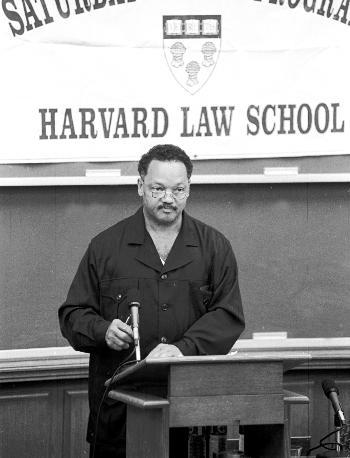Warning the nation against “a war policy based on revenge and emotions,” the Rev. Jesse Jackson called for a global alliance against terrorism in a speech yesterday morning at Harvard Law School (HLS).
Calling attention to the estimated 500,000 orphans in Afghanistan, Jackson urged the U.S. to “build bridges” to countries such as Iraq, Iran and even Taliban-ruled Afghanistan, which he said have been alienated by the West.
Jackson, who said he has been busy in the past few weeks ministering to the victims of the Sept. 11 terrorist attacks and urging caution in foreign policy, addressed a packed Austin Hall classroom for more than an hour as part of a series of speakers in HLS’s “Saturday School” program run by Climenko Professor of Law Charles J. Ogletree.
The Austin Hall podium occasionally seemed more like a pulpit as Jackson exhorted his audience to remember the oppressed and the marginalized around the world who could be harmed by U.S. retaliation.
He also said that engaging Arab countries traditionally at odds with the U.S. through trade, diplomacy, and debt forgiveness could help prevent future terrorism.
“The economic insecurity of the desperate breeds these [terrorist] camps,” Jackson said.
But Jackson’s message was not only one of caution. He urged the country to “rally under the flag”—and to remember that “Muslims, Sikhs and those who look like Muslims” are Americans too and must not be persecuted.
Jackson compared the situation of the United States toa great boxer who after being knocked down rose from the canvas to defeat his opponent.
“The ground is no place for a champion,” he said. “You cannot let your faith wither on the canvas.”
But a knockout punch against Afghanistan is not what Jackson said he is looking for.
He said he has issued a set of values—advocating respect for international law, economic aid and concern for human rights and the poor—which he said should guide the Bush administration in preparing its response.
But his list of values, he said, has been rejected by government authorities for being “too soft.”
Jackson, however, said his approach is practical from a military standpoint as well.
He said the U.S. faces an intelligence deficit which could be remedied by diplomatic efforts toward usually shunned countries in the Arab world.
“People who we do not talk to have what we need,” Jackson said, speaking of U.S. intelligence findings on the whereabouts of those who committed the Sept. 11 attacks.
Read more in News
Law School To Produce ‘The Crucible’













